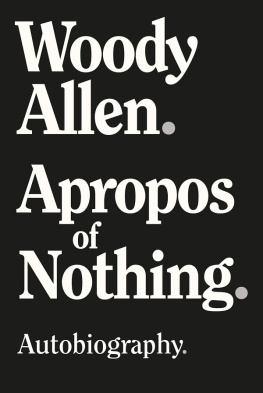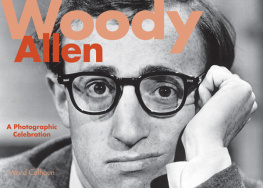Woody Allen - Getting Even
Here you can read online Woody Allen - Getting Even full text of the book (entire story) in english for free. Download pdf and epub, get meaning, cover and reviews about this ebook. genre: Detective and thriller. Description of the work, (preface) as well as reviews are available. Best literature library LitArk.com created for fans of good reading and offers a wide selection of genres:
Romance novel
Science fiction
Adventure
Detective
Science
History
Home and family
Prose
Art
Politics
Computer
Non-fiction
Religion
Business
Children
Humor
Choose a favorite category and find really read worthwhile books. Enjoy immersion in the world of imagination, feel the emotions of the characters or learn something new for yourself, make an fascinating discovery.

- Book:Getting Even
- Author:
- Genre:
- Rating:3 / 5
- Favourites:Add to favourites
- Your mark:
- 60
- 1
- 2
- 3
- 4
- 5
Getting Even: summary, description and annotation
We offer to read an annotation, description, summary or preface (depends on what the author of the book "Getting Even" wrote himself). If you haven't found the necessary information about the book — write in the comments, we will try to find it.
Getting Even — read online for free the complete book (whole text) full work
Below is the text of the book, divided by pages. System saving the place of the last page read, allows you to conveniently read the book "Getting Even" online for free, without having to search again every time where you left off. Put a bookmark, and you can go to the page where you finished reading at any time.
Font size:
Interval:
Bookmark:
Annotation
After three decades of prodigious film work (and some unfortunate tabloid adventures as well), it's easy to forget that Woody Allen began his career as one heck of a great comedy writer. Getting Even, a collection of his late '60s magazine pieces, offers a look into Allen's bag of shtick, back when it was new. From the supposed memoirs of Hitler's barber: "Then, in January of 1945, a plot by several generals to shave Hitler's moustache in his sleep failed when von Stauffenberg, in the darkness of Hitler's bedroom, shaved off one of the Fhrer's eyebrows instead"
Even though the idea of writing jokes about old Adolf-or addled rabbis, or Maatjes herring-isn't nearly as fresh as it used to be, Getting Even still delivers plenty of laughs. At his best, Woody can achieve a level of transcendent craziness that no other writer can match. If you're looking for a book to dip into at random, or a gift for someone who's seen Sleeper 13 times, Getting Even is a dead lock.

Venal amp; Sons has at last published the long-awaited first volume of Metterlings laundry lists (The Collected Laundry Lists of Hans Metterling, Vol. I, 437 pp., plus XXXII-page introduction; indexed; $18.75), with an erudite commentary by the noted Metterling scholar Gunther Eisenbud. The decision to publish this work separately, before the completion of the immense four-volume aeuvre, is both welcome and intelligent, for this obdurate and sparkling book will instantly lay to rest the unpleasant rumors that Venal amp; Sons, having reaped rich rewards from the Metterling novels, play, and notebooks, diaries, and letters, was merely in search of continued profits from the same lode. How wrong the whisperers have been! Indeed, the very first Metterling laundry list
List No. 1
6 prs. shorts
4 undershirts
6 prs. blue socks
4 blue shirts
2 white shirts
6 handkerchiefs
No Starch
serves as a perfect, near-total introduction to this troubled genius, known to his contemporaries as the Prague Weirdo. The list was dashed off while Metterling was writing Confessions of a Monstrous Cheese, that work of stunning philosophical import in which he proved not only that Kant was wrong about the universe but that he never picked up a check. Metterlings dislike of starch is typical of the period, and when this particular bundle came back too stiff Metterling became moody and depressed. His landlady, Frau Weiser, reported to friends that Herr Metterling keeps to his room for days, weeping over the fact that they have starched his shorts. Of course, Breuer has already pointed out the relation between stiff underwear and Metterlings constant feeling that he was being whispered about by men with jowls (Metterling: Paranoid-Depressive Psychosis and the Early Lists, Zeiss Press). This theme of a failure to follow instructions appears in Metterlings only play, Asthma, when Needleman brings the cursed tennis ball to Valhalla by mistake.
The obvious enigma of the second list
List No. 2
7 prs. shorts
5 undershirts
7 prs. black socks
6 blue shirts
6 handkerchiefs
No Starch
is the seven pairs of black socks, since it has been long known that Metterling was deeply fond of blue. Indeed, for years the mention of any other color would send him into a rage, and he once pushed Rilke down into some honey because the poet said he preferred brown-eyed women. According to Anna Freud (Metterlings Socks as an Expression of the Phallic Mother, Journal of Psychoanalysis, Nov., 1935), his sudden shift to the more sombre legwear is related to his unhappiness over the Bayreuth Incident. It was there, during the first act of Tristan, that he sneezed, blowing the toupee off one of the operas wealthiest patrons. The audience became convulsed, but Wagner defended him with his now classic remark Everybody sneezes. At this, Cosima Wagner burst into tears and accused Metterling of sabotaging her husbands work.
That Metterling had designs on Cosima Wagner is undoubtedly true, and we know he took her hand once in Leipzig and again, four years later, in the Ruhr Valley. In Danzig, he referred to her tibia obliquely during a rainstorm, and she thought it best not to see him again. Returning to his home in a state of exhaustion, Metterling wrote Thoughts of a Chicken, and dedicated the original manuscript to the Wagners. When they used it to prop up the short leg of a kitchen table, Metterling became sullen and switched to dark socks. His housekeeper pleaded with him to retain his beloved blue or at least to try brown, but Metterling cursed her, saying, Slut! And why not Argyles, eh?
In the third list
List No. 3
6 handkerchiefs
5 undershirts
8 prs. socks
3 bedsheets
2 pillowcases
linens are mentioned for the first time: Metterling had a great fondness for linens, particularly pillowcases, which he and his sister, as children, used to put over their heads while playing ghosts, until one day he fell into a rock quarry. Metterling liked to sleep on fresh linen, and so do his fictional creations. Horst Wasserman, the impotent locksmith in Filet of Herring, kills for a change of sheets, and Jenny, in The Shepherds Finger, is willing to go to bed with Klineman (whom she hates for rubbing butter on her mother) if it means lying between soft sheets. It is a tragedy that the laundry never did the linens to Metterlings satisfaction, but to contend, as Pfaltz has done, that his consternation over it prevented him from finishing Whither Thou Goest, Cretin is absurd. Metterling enjoyed the luxury of sending his sheets out, but he was not dependent on it.
What prevented Metterling from finishing his long-planned book of poetry was an abortive romance, which figures in the Famous Fourth list:
List No. 4
7 prs. shorts
6 handkerchiefs
6 undershirts
7 prs. black socks
No Starch
Special One-Day Service
In 1884, Metterling met Lou Andreas-Salome, and suddenly, we learn, he required that his laundry be done fresh daily. Actually, the two were introduced by Nietzsche, who told Lou that Metterling was either a genius or an idiot and to see if she could guess which. At that time, the special one-day service was becoming quite popular on the Continent, particularly with intellectuals, and the innovation was welcomed by Metterling. For one thing, it was prompt, and Metterling loved promptness. He was always showing up for appointments early-sometimes several days early, so that he would have to be put up in a guest room. Lou also loved fresh shipments of laundry every day. She was like a little child in her joy, often taking Metterling for walks in the woods and there unwrapping the latest bundle. She loved his undershirts and handkerchiefs, but most of all she worshipped his shorts. She wrote Nietzsche that Metterlings shorts were the most sublime thing she had ever encountered, including Thus Spake Zarathustra. Nietzsche acted like a gentleman about it, but he was always jealous of Metterlings underwear and told close friends he found it Hegelian in the extreme. Lou Salome and Metterling parted company after the Great Treacle Famine of 1886, and while Metterling forgave Lou, she always said of him that his mind had hospital corners.
The fifth list
List No. 5
6 undershirts
6 shorts
6 handkerchiefs
has always puzzled scholars, principally because of the total absence of socks. (Indeed, Thomas Mann, writing years later, became so engrossed with the problem he wrote an entire play about it,
Next pageFont size:
Interval:
Bookmark:
Similar books «Getting Even»
Look at similar books to Getting Even. We have selected literature similar in name and meaning in the hope of providing readers with more options to find new, interesting, not yet read works.
Discussion, reviews of the book Getting Even and just readers' own opinions. Leave your comments, write what you think about the work, its meaning or the main characters. Specify what exactly you liked and what you didn't like, and why you think so.








